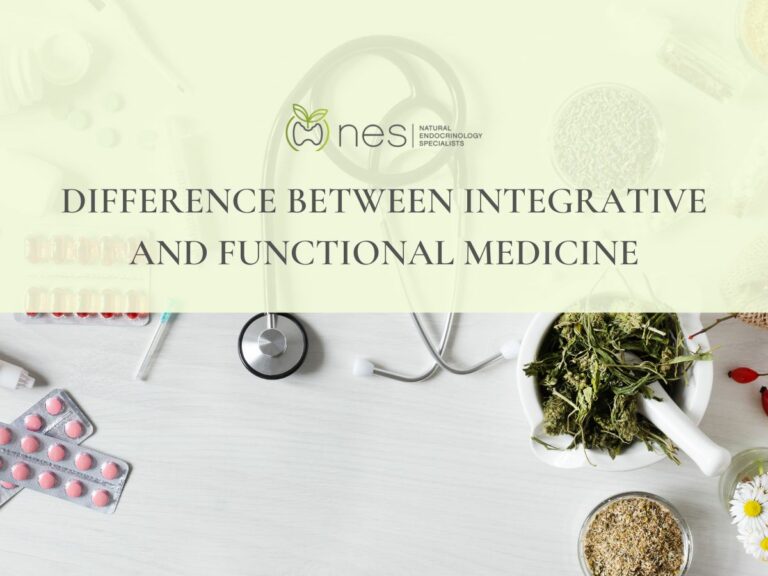Integrative medicine is a style of medicine that is patient-centered and is focused on healing the body. It offers therapies that are usually combined with Western and Eastern medicine. We will explore what integrative health is and explain what it consists of. It has a strong focus on lifestyle medicine and how this can help […]

Integrative medicine is a style of medicine that is patient-centered and is focused on healing the body. It offers therapies that are usually combined with Western and Eastern medicine.
We will explore what integrative health is and explain what it consists of.
It has a strong focus on lifestyle medicine and how this can help patients heal from current diseased states. It employs behavior change, continuity of care, and empowerment strategies to help patients achieve optimal outcomes in their health.
Integrative Medicine is also known as team-based medicine as partnerships in health are heavily emphasized and encouraged.
The full definition of health addresses inpatient visits and focuses on mind, body, and spirit. Once these levels are managed and optimized, a patient can truly experience health.
This type of medicine approach has been shown to help improve the health care crisis by focusing on preventing disease and illness and assisting patients in living healthier lives. As a result, don't overburden the existing healthcare system.
Patients are increasingly becoming aware of Integrative medicine and are actively researching and sourcing it out for health care needs.
Unfortunately, some Integrative health care options are out of pocket, and patients have to self-pay unless they have insurance coverage for prevention and wellness.
More and more insurance companies recognize the benefits of Integrative medicine and provide opportunities for patients to be rewarded for health promotion activities.
The modalities used in Integrative medicine include homeopathy, acupuncture, yoga, meditation, and exercise and nutrition.

It is a similar style of medicine to Integrative medicine as it is also focused on healing. Functional medicine tends to emphasize treating the root cause of disease and illness, and Integrative medicine tends to bridge both Eastern and Western medicine therapies together.
Functional medicine differs from Integrative medicine as it employs a unique and personalized approach to health care. This is not a one size fits all medicine. The individual is treated and not the disease. This approach is gaining popularity among patients, and it is known as the future of medicine.
Many patients do not want a band-aid approach or walk into a doctor's office to only leave with a script to manage symptoms. They want to know WHY they have an issue and HOW to solve it naturally first.
These types of patients who seek out Functional medicine generally have chronic and autoimmune conditions; therefore, just a plain prescription does not solve the problem. They do not want to be told what to do. They want a partnership in health and a plan to get better.
They want to learn what causes the condition and how to manage it using lifestyle changes and behaviors, foods, exercises, natural supplements, and medications if needed.
Physicians who practice functional medicine offer patients way more specialty lab testing that dives deep into finding underlying causes such as genetics, microbiome causes, nutritional excesses or deficiencies, hormones, and how the body works together to understand the relationships in the body.
Integrative health is the same as Integrative medicine in that the focus is on health and wellbeing and not just on medicine.
It takes an overall systems approach and utilizes both alternative and complementary medicine and Western medicine, also known as allopathic medicine. Many types of practitioners use integrative medicine, such as Chiropractors, Acupuncturists, Nutritionists, Naturopathic Physicians, Doctors of Osteopathic Medicine, and health coaches.

Using this approach, both patients and physicians can achieve maximum health benefits and help nurture the human body by preventing chronic diseases. This approach helps manage stress and teaches the patient how to take care of their body.
Physicians teach patients how to eat for their body, what exercise is best for them, the importance of sleep and stress management.
By just focusing on these basic tenants of health, much healing occurs. If patients continue to struggle with health, nutritional supplements can be incorporated to bridge the gaps. If they require further assistance, then the use of medications is added.
This approach focuses on collaboration with the patients, and this partnership generally results in positive health outcomes, patient and physician satisfaction, compliance, and reducing the healthcare burden.
A wellness assessment is a tool that provides insight into how well a patient's health is. It provides basic medical information such as chemistry, metabolic markers, and subjective and objective information to help assess if the body is working normally.

The difference in Integrative Health is that normal and optimal have two different meanings. Normal can mean that you are doing well compared to many others, but Optimal shows that a patient is thriving.
A wellness assessment is usually performed in a brief survey that highlights the areas where patients excel and need improvement.
This is not a diagnostic tool such as testing for toxins. It is generally a tool that collects data and is useful for general information and feedback. Examples of questions seen in a wellness assessment include questions about weekly exercise, fruit and vegetable consumption, sleep patterns, stress ratings, social support, mood changes, and others.
This is a useful tool for patients who seek to improve their health and for either physicians or employers to see where they can focus on the areas of improvement. Examples of well-structured wellness tools used in medical, employment, research, and institutional settings.
Wellness is an evolving process, and it can change over time. For example, there are times in life when stress is less, and then it can quickly change to high stress in a short period.
Integrative health helps patients put their health into perspective and learn to adopt coping strategies that can help them maintain a state of optimal health.
Using these surveys helps patients to understand their current state of health and make them aware of the areas that are lacking and need improvement. Wellness assessments provide valuable information and data, which can help facilitate positive changes.

Acupuncture Session - $189.00
Acupuncture, Package of 4 - $636.00
Female Pellet Insertion Package - $518.00
Male Pellet Insertion Package - $744.00